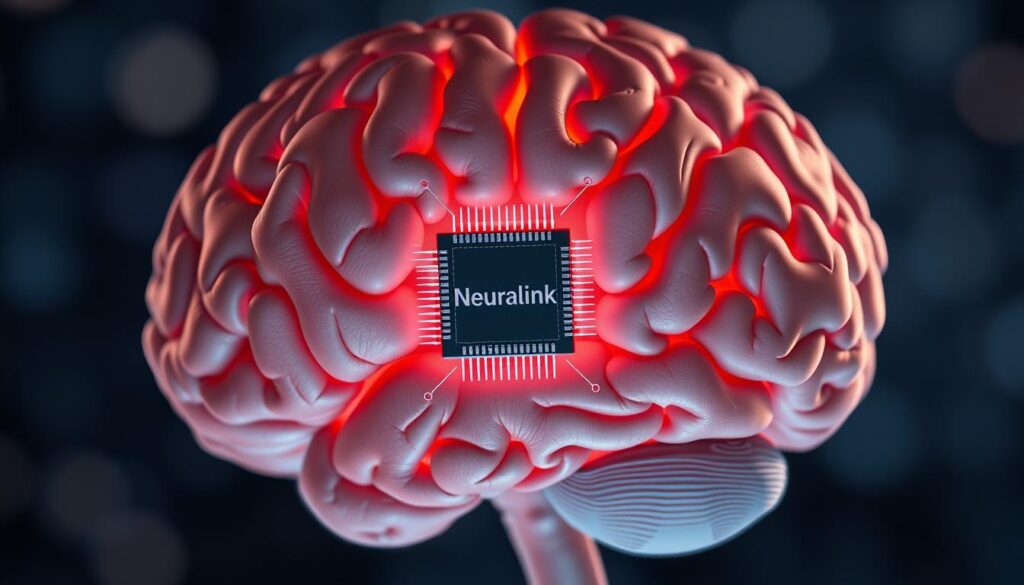Neuralink Brain-Computer Implants Chip in Groundbreaking First Human Trial
Neuralink makes history as it successfully trials its brain-computer interface in a human, marking a milestone in neurotechnology.

Neuralink Brain-Computer
Neuralink Brain-Computer: Neuralink made a significant breakthrough in brain technology by successfully implanting a chip in a human, Noland Arbaugh. This is a considerable leap in neurotechnology. Arbaugh, who can’t move his arms or legs, played chess with his mind. This shows how excellent Neuralink’s tech is.
The surgery happened at the Barrow Neurological Institute in Phoenix. Arbaugh went home just 24 hours later. The chip enables his brain to communicate with computers, showcasing Elon Musk’s vision for Neuralink’s significant impact on medicine and technology.
Neuralink Brain-Computer Key Takeaways
- Neuralink’s brain-computer interface chip was implanted in human pioneer Noland Arbaugh.
- The BCI chip enables neural activity translation into digital commands.
- The first successful demonstration took place at Fortune’s Brainstorm Tech conference.
- The minimally invasive surgery was performed at Barrow Neurological Institute.
- A neurotechnology breakthrough could change lives for those with paralysis.
- Elon Musk’s Neuralink is persistently expanding the frontiers of brain implant technology.
Neuralink’s Brain-Computer: A Revolutionary Step Forward
Neuralink is leading in new science with its brain-computer tech. This is a big step for humans and our lives. It makes computers and brains work together.
The Journey of Noland Arbaugh
Noland Arbaugh’s story shows how tech can change lives. He was hurt badly and couldn’t move much. Then, he got a chance to try Neuralink’s tech.
The surgery changed his life. It was approved by the FDA in May 2023. This was a significant advancement in neuroscience.
From Tragedy to Technological Triumph
After the surgery, Arbaugh’s life underwent significant changes. He could move more and do things on his own. He even traveled and studied more.
This incident shows how Neuralink’s tech can change lives. It’s a significant advancement in neuroscience technology.
Elon Musk’s Vision Becoming Reality
Elon Musk always dreamed big for Neuralink. He started with $158 million and made special probes. These probes have 3,072 electrodes.
By January 2024, they will have put a human brain-computer interface. This is called telepathy. It shows Musk’s dream is coming true. It could help with medical treatments and potentially enhance our intelligence.
Neuralink is pushing the limits of technology and human capabilities. It’s making a future where we can control computers with our minds.
How Neuralink’s Brain Chip Works
Neuralink’s brain chip is a significant advancement in brain-machine interface technology. It changes how we use digital devices. The chip has over 1,000 tiny electrodes that read brain signals and turn them into digital commands.
These electrodes are minuscule, measuring less than the width of a human hair. They help us communicate with computers using our minds. This invention is a significant step in making computers and brains work together more effectively.
The Science Behind Brain-Computer Interface Technology
The brain-chip tech uses electrodes in the brain to read and decode signals. These signals go to an outside device. There, they let us control gadgets with our thoughts.
An advanced chip processes these signals. It makes brain-computer talk easy. You can learn more about it in this article.
The Surgical Procedure and Its Minimal Impact
The chip is put in using special robots. These robots are very precise. They make sure the chip is placed right.
The surgery takes about two hours. It’s tiny and doesn’t hurt much after. Neuralink says the chip is fully implantable and looks invisible.
Real-World Application: Noland’s Chess Game
Noland Arbaugh played chess against a master using the chip. He controlled the pieces with his mind. This shows how powerful this tech can be.
Neuroprosthetics are becoming real. They’re not just ideas anymore. You can see how they work in these treatments.
| Feature | Details |
|---|---|
| Chip Size | Approximately the size of a coin |
| Electrodes | 1,024 thin, flexible electrodes |
| Signal Transmission | Bluetooth connectivity |
| Surgery Duration | About 2 hours |
| Patient Impact | Minimal postoperative pain |
Neuralink Brain-Computer Conclusion
Neuralink’s brain chip was successfully implanted in a human trial. This is a big step forward in neurotechnology. It could help people with severe brain disorders live better lives.
This technology enables people with paralysis to use digital devices. It could even help restore lost senses in the future. In May 2023, Neuralink got FDA approval for human trials. The approval means it can help more people, like those with movement disorders.
One person, Noland Arbaugh, showed how it works. He controlled his environment with his brain. This breakthrough is exciting for the future of brain-computer interfaces.
But we must consider ethics, too. We must guarantee the appropriate application of this technology. We must protect patients and keep their rights safe.
Studies like the CONVOY Study are enhancing Neuralink’s chip. But we must talk about ethics more. You can learn more on NCBI and Frontiers in Human Dynamics.







